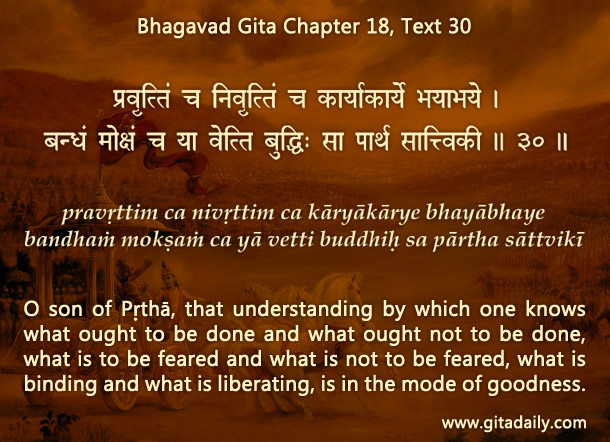Some people oppose the principle of forbidding anything: “If God didn’t want us to take intoxicants, why did he create intoxicating substances in nature? And why did he give us the urge to get intoxicated?”
Regarding enjoying naturally occurring things, are we meant to consume all of them? If yes, why don’t we consume poisonous plants?
Regarding our urges, Gita wisdom explains that our urges don’t always come from God; they may come from our own past actions, in this or previous lives. Those who didn’t indulge in lower pleasures may not have the corresponding urges now. Even if we put aside the issue of where an urge comes from, do we pander to all our urges? Do we eat or sleep as much as our urges prompt? Or watch TV as much as we want? We don’t, for we know with our intelligence that doing those things will ruin our health or waste our life.
Even if we accept that we are meant to use the things that God has given us, then one important thing he has given us is intelligence. We need to use that intelligence to evaluate which things are favorable for our evolution and which unfavorable (Bhagavad-gita 18.30).
When our intelligence is guided by Gita wisdom, we can infer that the purpose of harmful things may be different from what we presume: not that we taste them, but that they test us. They are like the wrong options that are given by the examiner in a multiple choice test.
Even if everything comes from God, everything may not take us to him — we need to intelligently choose those things that help us evolve and move toward him.
One-sentence summary:
Everything exists for a purpose, but that purpose may be that it tests us, not that we taste it.
Think it over:
- We should enjoy everything God has given — what’s wrong with this argument?
- Do our urges come from God?
- Why did God create harmful things?
***
18.30: O son of Prutha, that understanding by which one knows what ought to be done and what ought not to be done, what is to be feared and what is not to be feared, what is binding and what is liberating, is in the mode of goodness.
To know more about this verse, please click on the image
Explanation of article:
Podcast:


Hare Krishna . Absolute best …
Thank you – happy to be of service.
Everything exists for a purpose, but that purpose may be that it tests us, not that we taste it.- Wonderful summary!!
Excellent article prabhuji, Dandavats.
Happy to be of service.
Dandavat pranams prabhu
This sort of a marginal characteristic is always found traced in the human nature. The reality is perceived accordingly to the determined means of knowledge-seeking endeavours.
So, it is obvious that the materialist also pursue apparent truth and thus, perceive apparent reality.
No common ground can be established between a materialist and spiritualist. They are distinct by nature and are by far exactly opposite poles.
The absolute reality is eternal truth; and perceived only by the proper means of quest, viz. Bhakti.
Thank you very much for an wonderful article.
Endnote: Sri Krishna is very playful.
Prabhuji, Please excuse me if I had spoken anything incorrect. Make me fortunate by correcting my mistake.
Thanks.
Nothing incorrect at all; your comment was a sublime thought in itself. I didn’t have anything to add; so, I had approved the comment without commenting on it. Thanks for your thoughtful engagement with these articles.
I pay my heartful gratitude for your gracious benevolence upon this poor soul.